Turkish Diplomat Calls For Cooperation With Israel, Hinting At Iran
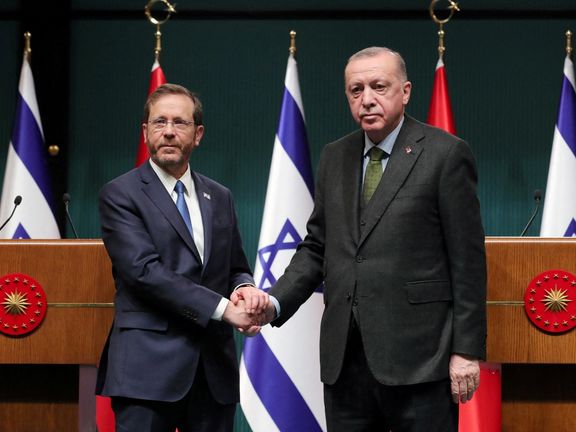
Ankara’s envoy to Washington has called for Israeli-Turkish cooperation in countering regional threats, in a possible hint at Iran, amid improving bilateral ties.

Ankara’s envoy to Washington has called for Israeli-Turkish cooperation in countering regional threats, in a possible hint at Iran, amid improving bilateral ties.
In an article published in Tel Aviv University's Dayan Center for Strategic Studies journal Turkeyscope on Tuesday, Ambassador Hasan Murat Mercan highlighted the strong historical relationship between the Jewish and Turkish nations and urged further cooperation, especially in fields of security and energy.
Without mentioning Iran, he wrote, “Turkish-Israeli interaction offers more than a conventional regional partnership in the face of malign actors and trends”, adding that “Dealing with malign actors and their activities throughout our region is a particular area for enhanced coordination”.
“A more robust regional security cooperation between the two, with a specific focus on fighting terrorism in all its forms and manifestations, will also have an added value to both countries’ national security,” he added.
Calling for engagement on regional affairs, he said that “Turkish-Israeli partnership would be effective to further curb destabilizing moves in broader Middle East and North Africa (MENA)”.
The power competition, which is the dominant trend in today’s world and runs the risk of confrontation, “writes off the so-called value of proxy-led spheres of influence” as “inter-regional and intra-regional alliances are becoming all the more relevant”.
Calling the Israeli President Isaac Herzog’s visit to Turkey “a visible message of peace and partnership”, he said both Herzog and Erdoğan defined the visit as a “new milestone” and expressed their shared goal to revive political dialogue and foster regional cooperation.

The killing of all US leaders would not be enough to avenge the assassination of Qasem Soleimani, an Iranian Revolutionary Guard commander said on Wednesday.
"Martyr Soleimani was such a great character that if all American leaders are killed, this will still not avenge his assassination," commander of the Revolutionary Guards (IRGC) ground forces Mohammad Pakpour was quoted as saying by Iranian state media.
"We should avenge him by following Soleimani's path and through other methods," he added.
Pakpour referred to missile and other attacks against American targets and Israel as alternatives to killing US leaders.
Soleimani was killed in a targeted air strike by the orders of former president Donald Trump on January 3, 2020 in Baghdad. He was Iran's top military and intelligence operator in the Middle East, organizing militant groups in Iraq, Syria, Yemen and elsewhere to attack American targets and US allies in the region.
Since his death, Iranian officials have threatened revenge against former Trump administration officials, including Secretary of State Mike Pompeo.
The statement comes as nuclear negotiations that started more than a year ago in Vienna are in limbo since March, because of Tehran’s demand for the United States to remove the IRGC from its Foreign Terrorist Organization (FTO) list.
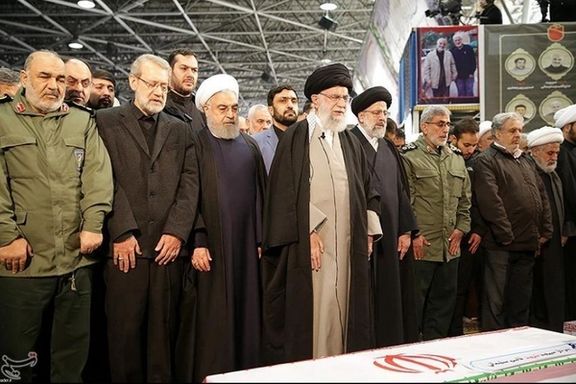
The Biden Administration so far has not accepted the demand, as bipartisan opposition in US Congress has grown to such a move. Pakpour’s statement might be intended to signal a retreat from the intention of killing American leaders, but it would hardly mollify those who aregue the IRGC is a terrorist organization.
However, reports have suggested Washington has been considering removing the IRGC from its foreign terrorist organization blacklist in return for Iranian assurances about reining in the elite force's influence in the Middle East.
Reports earlier also said that Washington might have offered Iran a solution to renounce any revenge against American leaders in exchange for removing IRGC as an FTO.
Then-US President Donald Trump’s administration said Soleimani was targeted for plotting attacks on US interests and that he had helped coordinate strikes on American forces in Iraq in the past through Iraqi Shiite militia proxies.
Pakpour's comments came days after US Army General Mark Milley, chairman of the Joint Chiefs of Staff, said that he does not support removing Iran's Qods (Quds) Force, an arm of its Revolutionary Guards, from a list of foreign terrorist organizations, as demanded by Tehran.
Trump abandoned the 2015 nuclear agreement, known as JCPOA, under which Iran had agreed to curbs on its nuclear program in return for the lifting of international sanctions. Trump said the agreement was weak and could not prevent Iran from obtaining nuclear weapons in the future. He also demanded Tehran stop its meddling in the region and arming militant proxy groups.
Proponents of removing the iRGC from the US terrorist list argue that the move will have little practical impact as other sanctions will remain in place. Opponents of the move say that the FTO list is not just symbolic, and many US anti-terror laws are based on a formal terror designation.
Iran's top authority, Supreme Leader Ayatollah Ali Khamenei, said on Tuesday that his country's future should not be tied to the success or collapse of nuclear talks with world powers.
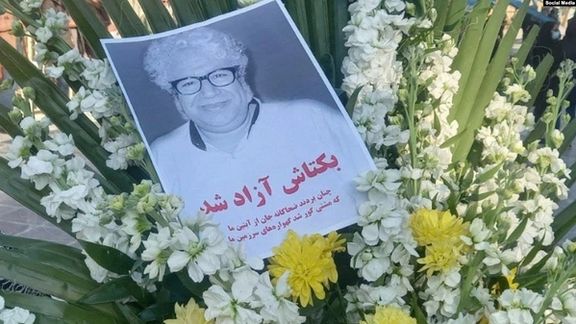
Amnesty International has slammed Iran for prisoner deaths resulting from deliberate denial of medical care, turning prisons into "waiting rooms for death".
In a new report, the global rights organization has documented how prison authorities routinely cause or contribute to deaths in custody, including by blocking or delaying prisoners’ access to emergency hospitalization. The 180-page briefing published on April 12 is based on reviewing ninety-six cases of death in custody in thirty prisons across Iran in the past twelve years.
In many cases, including the case of Nader Alizehi in Zahedan in 2017, prison authorities and its medical staff accused prisoners of "faking" or "exaggerating" their illness. When Alizehi sought medical care, he was sent away by prison clinic staff with gastrointestinal medication and died at the age of twenty-two in prison due to a heart condition.
Another young man, Abdolvahed Gomshadzehi, died in the same prison in Zahedan after prison officials refused to hospitalize him despite prison doctors' warning. The cause of the nineteen-year-old Gomshadzehi's death was neglected blood clots in his brain which he had sustained because of beatings during his arrest and interrogations two years earlier.

Like Gomshadzehi, at least eleven other prisoners out of the ninety-six, died after being denied medical care for injuries resulting from incidents that occurred at the time of their arrest or while they were in prison. The death of the remaining eighty-five resulted from heart attacks and strokes, gastrointestinal complications, respiratory complications, kidney problems, Covid-19 or other infectious diseases for which they had not received the required care.
“Deaths in custody resulting from the deliberate denial of healthcare amount to arbitrary deprivation of life, which is a serious human rights violation under international law," said Diana Eltahawy, deputy regional director for the Middle East and North Africa at Amnesty International who called the authorities' disregard for human life "chilling".
Denial of medical care affects ordinary prisoners as well as political prisoners and prisoners of conscience. In January, Iranian writer Baktash Abtin died of Covid-19 complications after he was denied timely treatment at Tehran’s notorious Evin prison. The Iranian Writers' Association alleged that Abtin’s condition was the direct result of “deliberate delay” to start his treatment.
Abtin was serving a six-year sentence for "propaganda against the state" and “assembly and collusion against national security”, two of the vaguely defined charges categorically brought against political dissidents.
In February 2021, another prisoner of conscience, Behnam Mahjoubi, aged thirty-three died in hospital after falling into a coma. Mahjoubi who was imprisoned for participating at a protest rally alleged he had suffered brutal torture in a psychiatric hospital during his imprisonment.
Out of the ninety-six prisoners whose deaths in custody were reviewed by Amnesty International, twenty-three were between 19 and 39 years of age, and twenty-six of them were between forty and fifty-nine.
Sixty-four of all these prisoners died inside their prison cells meaning they were not given even basic medical supervision in their final hours. Some died while in poorly equipped prison clinics, and at least 26 prisoners died during transfer or shortly after admission to hospital, following deliberate delays by prison medical staff and/or prison officials.
In at least six cases, critically ill prisoners were moved to solitary confinement, punishment wards or quarantine sections - four of these died alone in prison while two were eventually authorized for hospital transfers, but it proved too late, Amnesty said.

A judge in Washington DC ordered the release of two men arrested last week into family custody, saying prosecutors failed to prove a foreign connection.
United States District Court Magistrate Judge G Michael Harvey, after four detention hearings, released Arian Taherzadeh, 40 and Haidar Ali, 35, after prosecutors argued that they would pose a danger to the community. The judge ruled that prosecutors did not prove that the suspects had some foreign links, which would pose a danger to others, Iran International correspondent Arash Alaei reported.
Prosecutors asked for detention of suspects to continue until 9:00 am Wednesday for time to appeal the decision to release them.
Taherzadeh, with an Iranian and Ali with a Pakistani origin were arrested after federal authorities learned that they were impersonating United States Department of Homeland Security (DHS) agents and trying to befriend Secret Service and other federal personnel. Prosecutors say the suspects gave or offered lavish gifts to the government agents and possessed a range of law enforcement equipment and weapons.
During the detention hearings their defense attorneys argued that prosecutors took their clients’ actions out of context.
On the second day of a detention hearing on Monday, Judge Harvey said he had authority to convict the pair and sentence them to three years’ jail.
Defense attorneys on the third day of the hearing Tuesday morning said their clients had not obstructed justice, that the federal prosecutor had jumped to conclusions, and that the men’s actions had been overblown into a media frenzy, which has included talks of links to Iranian intelligence.
Prosecutors told the third session of the hearing that four federal agents were “compromised” because of contacts with the suspects. One is a Secret Service agent in First Lady Jill Biden’s protection detail. However, prosecutors are still not accusing the men of being agents for a foreign intelligence service, although they continue to look into that.
It is not clear why the suspects spent large suns of money to give gifts to federal personnel and maintain several expensive apartments in a Washington DC building, offering their targets free occupancy in these units. Taherzadeh also got access to the building’s security system and was monitoring the residents.
Taherzadeh’s lawyer Michelle Peterson said her client was charged with bribing federal agents due to an offer of cigars. "They have jumped to the wildest conspiracy theories imaginable over the most scant of evidence," she said.
In response to Judge Harvey calling Taherzadeh “a danger to the community” because he possessed rifles, Peterson said her client was “not a flight risk or violent, and must be freed.” The lawyer argued that “lying about his identity to common people doesn't amount to a crime.”
Ali’s attorney Gregory Smith said the allegations were preposterous: "They have been making a mountain out of a molehill, and it is time for it to end.” Taherzadeh and Ali allegedly began posing as law enforcement agents in February 2020, the month after a US drone strike in Baghdad killed Iranian general Qasem Soleimani and nine others.
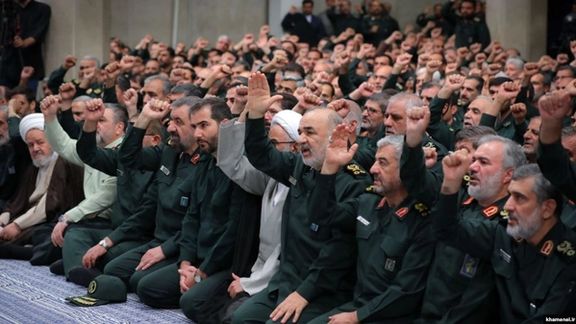
A group of more than 500 Iranian American scientists and scholars have urged President Joe Biden not to remove Iran's IRGC from list of Foreign Terrorist Organizations.
The letter, led by University of Connecticut professor and dean of the School of Engineering, Kazem Kazerounian, said the regime’s demand to delist the IRGC is “unquestionably against the will and interest of the Iranian people, and a direct threat to the advancement of democracy.
“The IRGC is the tool of terrorism abroad and repression of people on the streets of Iran… This instrument of terror safeguards the religious dictatorship in Iran, and continues to impede all progress towards human rights”, read the letter.
Pointing out Iranians’ century-long struggle “for freedom", the signatories said that "removing IRGC from the FTO list will project blatant disregard for the hope and legitimate struggle of Iranians for freedom and dignity”.
The letter added that not only “IRGC has not shown the slightest indication of good faith efforts in halting malign behavior”, it is playing “a bigger role in creating proxy naval terror units, employing UAVs for terror operations, and funding terrorism around the globe”.
Since February 2021, the Iranian Professionals' Ad Hoc Committee on Iran Policy, coordinated by Kazerounian, has sent other open letters to Biden, each signed by several hundreds of Iranian Americans scholars, professors, physicians, industry executives and successful entrepreneurs.
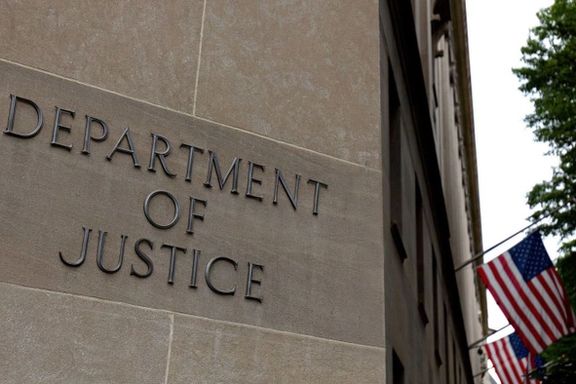
During a second detention hearing in a Washington DC court, prosecutors said they are looking to see if two suspects arrested last week have any foreign links.
Lawyers for the two men arrested last week for allegedly posing as United States Department of Homeland Security (DHS) agents have said prosecutors took their actions out of context.
Arian Taherzadeh, 40, with Iranian origin and Haider Ali, 35, originally from Pakistan, both US citizens, are charged with impersonating a federal officer. But authorities allege that the suspects lavished expensive gifts on Secrete Service and other federal personnel, ostensibly to get close to them.
On the first day of a detention hearing in Washington DC Monday, Judge G Michael Harvey said he had authority to convict the pair and sentence them to three years’ jail, Iran International’s Arash Alaei reported from the courtroom.
Defense attorneys on the second day of the hearing on Tuesday said their clients had not obstructed justice, that the federal prosecutor had jumped to conclusions, and that the men’s actions had been overblown into a media frenzy, which has included talks of links to Iranian intelligence.
Prosecutors told the second session of the hearing that four federal agents were “compromised” because of contacts with the suspects. One is a Secret Service agent in First Lady Jill Biden’s protection detail. However, prosecutors are still not accusing the men of being agents for a foreign intelligence service, although they continue to look into that.
It is not clear why the suspects spent large suns of money to give gifts to federal personnel and maintain several expensive apartments in a Washington DC building, offering their targets free occupancy in these units. Taherzadeh also got access to the building’s security system and was monitoring the residents.
Taherzadeh’s lawyer Michelle Peterson said her client was charged with bribing federal agents due to an offer of cigars. "They have jumped to the wildest conspiracy theories imaginable over the most scant of evidence," she said.
In response to Judge Harvey calling Taherzadeh “a danger to the community” because he possessed rifles, Peterson said her client was “not a flight risk or violent, and must be freed.” The lawyer argued that “lying about his identity to common people doesn't amount to a crime.”
Ali’s attorney Gregory Smith said the allegations were preposterous: "They have been making a mountain out of a molehill, and it is time for it to end.” Taherzadeh and Ali allegedly began posing as law enforcement agents in February 2020, the month after a US drone strike in Baghdad killed Iranian general Qasem Soleimani and nine others.